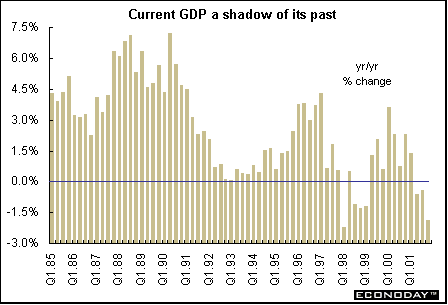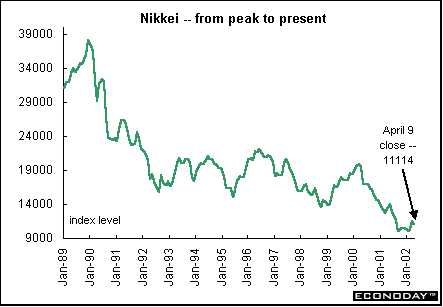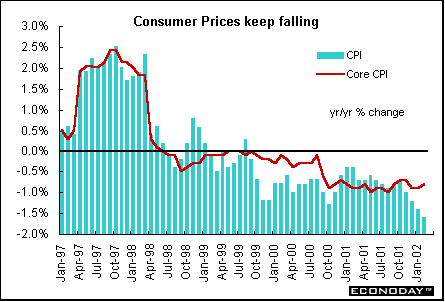Only ten years ago most world economies looked to emulate Japan and its mighty growth machine. Times have changed. Now others give advice to Japan, wanted or unwanted, in an effort to break the vicious circle of downward spiraling prices, rising unemployment, soaring bankruptcies and debt. Worries that the banking system could collapse also resonate throughout political and business commentary.

Japan's problems are both economic and political. The bureaucrats who populate the ministries are entrenched in a seniority-based lifetime employment system and are unwilling to give up their power or their way of doing things. After World War II, the close ties between the government, bureaucrats and industry helped Japan rise to become the world's second biggest economy. This doesn't work now. Japan needs more flexibility to cope with the profound changes brought about by knowledge-based economies and the rapid spread of globalization.
A succession of governments and massive spending programs that invested heavily in infrastructure have not helped reenergize the economy. The present prime minister, Junichiro Koizumi, has promised to sweep out the cobwebs. But as fiscal year-end approached (March 31) an old ritual kicked in as fears of a financial meltdown accelerated and investors sold equities. The sell-off raised more worries about banks as they lost billions on their stock and bond holdings. Seemingly on cue, the government cobbled together a spending package, extended a deadline and changed a regulation. Relieved that collapse has been kept at bay again, investors returned to the markets. After the benchmark Nikkei 225 stock index fell to an 18-year low on February 6, the government announced tougher inspections of the country's debt-laden banks, dangled the promise of a bank bailout, and clamped down on short selling.
That set off a 22 percent rally in the Nikkei over the next month as fears subsided that bankruptcies would cascade. The Nikkei has since lost ground as investors suspect that the government is more interested in getting banks through another fiscal year than in engineering a more radical - and more painful - resolution to the economy's woes. Consider the recent efforts to aid the stock market. The government went after some short selling (bets that a stock will decline) that it deemed illegal. Though most speculators were chased away allowing the market to rise, the move did nothing to resolve the reason for the short selling - the poor profitability of Japanese companies.

Japan's problems are not only cyclical but reflect structural imbalances as well. To prop up the economy, the government and the central bank have exhausted most traditional policy tools. Interest rates are at zero but banks are not lending. After spending nearly 100 trillion yen ($753 billion) in the last decade to spur growth, the government now has the heaviest debt load in the industrialized world and is reluctant to issue new bonds or cut taxes. Many business sectors, especially construction and retailing, need to be restructured. There is excess capacity in the industrial base partly because businesses, thanks to cheap bank financing, have traditionally been encouraged to over invest. Although the auto sector is highly competitive many other highly protected domestic sectors are not. Any attempt to impose reforms would be painful, since it would involve a flood of bankruptcies and job losses that would drag down growth still more. And thus far the government has explicitly resisted using tools such as yen-devaluation to help devalue assets, nationalizing and closing banks, or allowing weak companies to fail in numbers.
The much awaited report of the Financial Services Agency (FSA) on the banking system's condition is due to be released Friday. The banks have already issued guidance showing that they will report sizable losses for the 2001 fiscal year that ended on March 31. The figures are expected to be mind-boggling. But it could have been worse without the recent stock market rally that raised the level of the Nikkei over 10,000 and improved the market value of equity holdings. This will prove critical since banks, until the end of the last fiscal year, had been able to value equities at generally much higher purchase prices. Now banks must value equities at the much lower market value. This shrinks the capital base of the banks and puts their already questionable solvency to the test. Analysts generally agree that if the FSA report shows only mild losses, questions will arise over the accuracy and consistency of individual bank data. While if nonperforming loans are surprisingly heavy, questions will be raised about the viability of some of the banks.
Since the financial and real estate bubble burst in the late 1980s, prices have been falling in Japan. And falling prices for goods and services - or deflation - has been plaguing the nation for some time now. When falling prices get imbedded psychologically, purchases are postponed until prices stop falling. Then sellers, in order to entice customers, cut prices even more. Just as rising prices can spiral and feed upon itself to cause inflation, so can falling prices, as is the case in Japan. The graph below shows recent price erosion.

BOTTOM LINE
At the core of many of Japan's problems is the virulent deflation that is plaguing the economy. Partly because of deflation, which decreases revenues and makes it harder to service debt, bad debts are growing more quickly than banks can write them off. In the past few days, a number of financial institutions have said their losses would be substantially greater than forecast. The banking system is burdened with an enormous amount of non-performing loans and lending has fallen for four years because these institutions have put all their efforts into providing for bad loans. There is a tussle within the government about how active a role the state should play in resolving the bad loan issue, which many believe to be a fundamental obstacle to Japan's economic recovery.
Japan is currently in its third recession in 10 years and the prognosis for recovery is dim. According to the Asian Development Bank, Japan is not expected to show positive growth until 2003. Any near term recovery could be weak at best and would be based on increased exports, which account for only 10 percent of the economy. Some worry that even a modest cyclical recovery could postpone the inevitable and the badly needed repairs to the struggling economy.
Anne D. Picker
International Economist, Econoday
| 